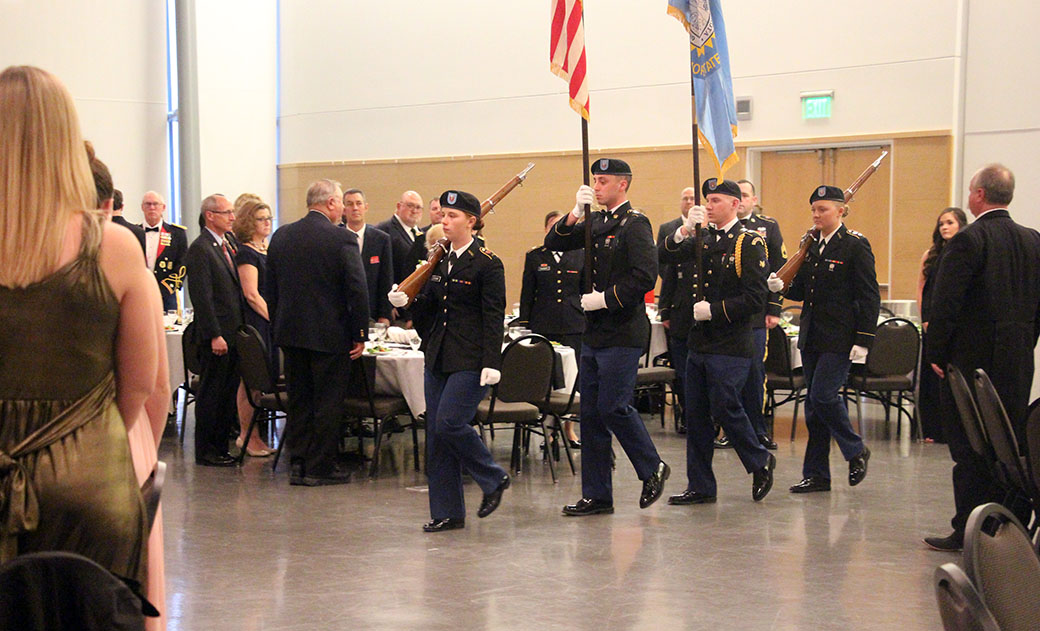
Students, cadre look to USD ROTC as leadership-builder
USD’s Reserve Officers’ Training Corps is dedicated to turning students into army leaders.
The 29 students involved in USD’s ROTC participate in daily physical training, an annual military ball and other traveling opportunities.
Michelle Bunkers, a professor of military science, said ROTC “builds leaders of character.”
“We stress academics, fitness and leadership in order for cadets to commission into the army as second lieutenants,” Bunkers said.
Ashley Flood, a junior criminal justice major and a member of the South Dakota National Guard, has been in ROTC for a year. She’s been in the National Guard since June 2015 and is also part of the color guard.
“I’m fairly new to all of it, actually,” Flood said. “To further my education in my experiences and my role in the South Dakota National Guard, I decided to join ROTC and become an officer.”
In order to obtain a scholarship through ROTC, Bunkers said students must maintain a “good GPA,” pass the army’s physical fitness test and have a background in civics or leadership skills.
“If somebody shows proclivity, it depends on the person, because we look at the person as a whole,” Bunkers said. “They may come in (and) maybe their grades aren’t that great, but they have all this leadership experience. You have to weigh that, look at it holistically.”
Flood’s role in ROTC presented her with the opportunity to go to Estonia this summer through the Cultural Understanding in Language Proficiency (CULP) program, where she’ll spend a month with a team learning about different cultural experiences and foreign
language proficiency.
Flood will also be taking an intense air assault course through ROTC.
“It’s a really good way to grow as a leader, you get a lot of leadership experiences both verbally and in writing,” she said.
If a student is contracted, some benefits include a monthly stipend of about $300 for first-years, and up to $500 for seniors and leadership training.
“It’s never a dull moment,” Bunkers said. “We don’t sit behind a desk. You also make lifelong friends and colleagues.”
Tanner Smith, a first-year social work major and a member of the National Guard, said USD’S ROTC offers many benefits.
“It’s made me an all-around better person,” Smith said. “It helps me keep on top of my stuff, all my school work. It helps transform you into a leader, and helps you out with your communication skills.”
Making connections
Smith and Flood both attended the 97th annual military ball, which was held on March 25.
Smith said he likes what the ball stands for.
“It gives us a chance to recognize the seniors and all the hard work they’ve put in their last four years, and just have a good time with your friends,” Smith said.
ROTC also offers field, exercise and first-aid training. Flood said her schedule consists of physical training workouts in the Dakota Dome three times a week and post-physical training sessions twice a week at the Wellness Center.
“There’s a very broad array of educational things,” Flood said. “Especially if you’re already in the National Guard or if you want to be — ROTC is a great way to kind of start that or to further push yourself and further educate and just better yourself.”
Smith said he has good relationships with his fellow cadets and cadre.
“You make a lot of good friends, friends I didn’t have before,” Smith said.
There’s a balancing act Flood said she goes through with ROTC, school and her social life, though she said it’s not difficult because she loves what she does.
“It makes it really easy because we are a tight-knit group,” Flood said. “It’s really difficult for some people to balance the PT and all the different events. But it’s easily doable.”
Flood said having ROTC on campus is “very important.”
“You have ROTC on college campuses because it offers students at that specific campus a great way to get involved with the United States military,” Flood said. “People don’t realize how great ROTC is. It’s a great resume-builder and it’s very beneficial to those who do it. It’s a very good way to become an officer in the military because you can do the civilian thing for four years while you’re going to school, then you can go active duty as an officer, and you don’t have to go the other routes that you could take.”
Some of Flood’s biggest accomplishments have been in the National Guard and USD ROTC, including being the team captain for the ranger challenge last semester in Minnesota and winning fifth place overall. Flood said she has a lot of personal accomplishments, too.
“Coming here, I’ve definitely improved on my leadership skills and my confidence,” she said. “I’m constantly learning about the different things that an officer would need to know in the army — little things I’m picking up on that I never would have known before in the National Guard.”


